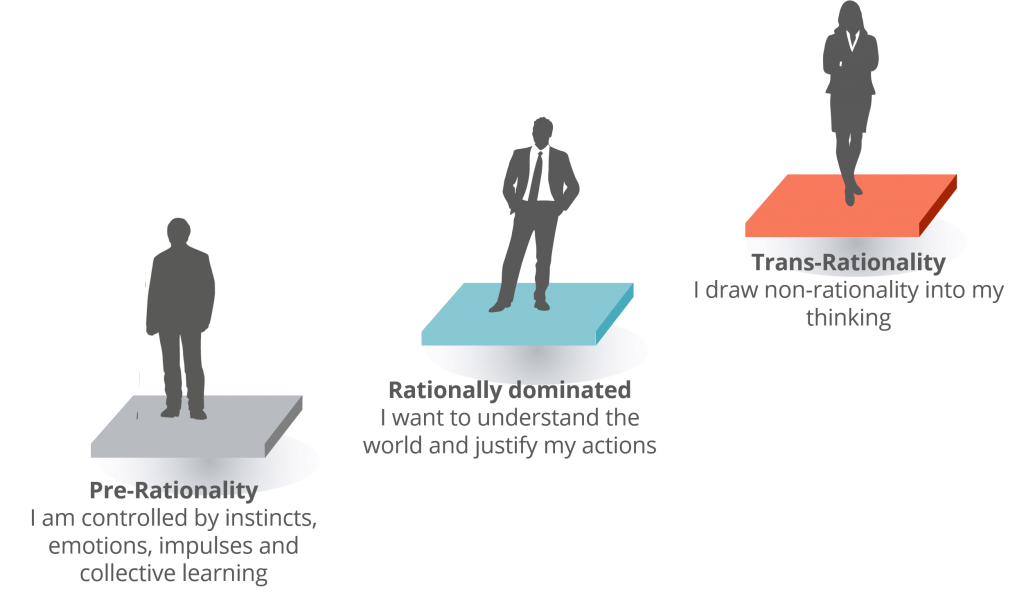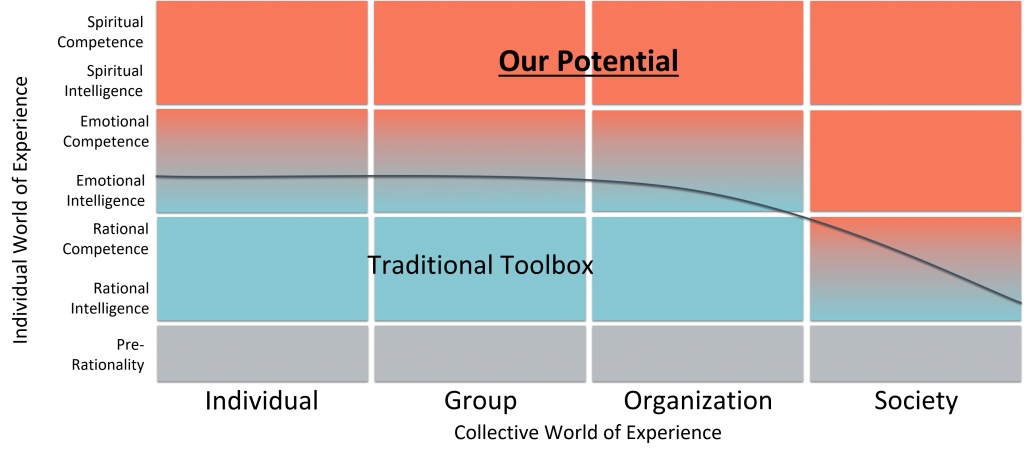In a social consensus we have banned emotions and spirituality from our assessment and decision-making systems. We are thus overlooking a very large, if not the vast majority, of the options available to us as managers in terms of decisions. A central concern of Committed Leadership is to make emotionality and spirituality accessible to managers in such a way that they can use them as a source of information in addition to their rationale, from a state of comprehensive inner understanding, and therefore make good decisions[i] in their leadership role. As a pleasant side-effect, you also achieve deep inner peace yourself and radiate this peace to your fellow men and employees.
In psychology, a blind spot is the part of our personality that we have but are not able to perceive ourselves. We lack awareness of this. As a consequence, we do not use our full potential because we cannot use a part of ourselves. On the other hand, we compensate for the unnoticed part of our personality by usually rather unfortunate behaviour. We then act in our so-called “shadow”.
In the self-understanding of Committed Leadership, this definition is expanded to include the lack of awareness of phenomena that we, as leaders, ignore as a social consensus within ourselves, and therefore do not consciously perceive them and precisely then do not take them into account in our possibilities: These are in particular the emotionality and spirituality within us.
Trans-Rationality Expands Our Possibilities
Roughly speaking, the consciousness of a person develops in three stages: The development starts on the pre-rational stage, in which we perceive ourselves and our environment without a rational mind. At this stage we find toddlers or babies. After that the human being develops to the rational stage. At least 95% of adult humans are at this stage. The third stage of consciousness development is then the trans-rational stage, where we allow other sources of information, e.g. emotions or spirituality, in addition to the rational mind.
 Figure: The Three Elementary Stages Of Consciousness
Figure: The Three Elementary Stages Of Consciousness
We notice emotions and spirituality as non-rational phenomena as physical sensations or sudden inspirations. When we notice them, we often do so without being able to give a plausible explanation for their occurrence. This is what makes it so difficult to deal with. However, each of us has had “an intuition” or reacted “intuitively” correctly in a situation and can therefore confirm that they exist, these trans-rational phenomena. We were only instructed to classify them as unhelpful, rather than disturbing. Especially in the world of leadership-alpha animals, emotions and spirituality are frowned upon and perceived as signs of unprofessionalism. As a rule, we – no matter whether we are executives or not – are no longer able to perceive the clues of our feelings or our spirituality and even less able to interpret them appropriately. We have become emotionally and spiritually incompetent.
However, if we do not include emotions and spirituality in our perceptions and evaluations, our decisions will only ever consider a fraction of the possibilities that actually exist. We have a blind spot in our perception and decision systems.
This blind spot is increasingly becoming a danger for us, our companies and the society in which our companies operate. This is because the rational mind is already frequently reaching its limits today due to the ever-increasing complexity of the tasks that managers have to deal with. In the future, it will be vital for a manager to supplement his or her own rationality with further levels of reason.
At the same time, it is important to note that dealing with emotions and spirituality in the context of Committed Leadership is not about abolishing rational thinking. Not at all.
The rational mind is needed to evaluate our trans-rational insights and to place them in an overall context. Albert Einstein is said to have put it in a nutshell when he said: “The intuitive mind is a sacred gift, the rational mind a faithful servant.” But Einstein also recognized that in our society today, we exalt the mind: “We have created a society that honors the servant and has forgotten the gift.”[2]
The rational mind distinguishes us from all other primates and it is to him that we owe our advanced civilization. But it can’t do everything. Leadership decisions of trans-rationality explicitly include rationality, as well as emotionality and spirituality. They use the whole solution space.
Become Emotionally And Spiritually Competent
The concept of emotional intelligence by Daniel Goleman[3] has been known and popular since about the mid-nineties of the last century. The works of Daniel Goleman fit very well into the idea of Committed Leadership. He is precisely concerned with incorporating emotionality into thinking and acting in addition to rationality. Many of his findings are taken up by Committed Leadership.
Committed Leadership is based on the assumption that everyone is emotionally intelligent, but not necessarily emotionally competent.
Why this distinction? Well, intelligence describes the basic possibilities of a person in a specific field of view, which are largely unchanged throughout his or her life. For example, the intelligence quotient IQ describes the logical-rational intelligence of a person measured in a test. An IQ of 80 is less intelligent than an IQ of 90, which, according to the understanding of intelligence, cannot be changed in one’s life. The IQ is, so to speak, predetermined by fate. But you can certainly work on making the best possible use of your IQ. And so it is quite possible that a person with an IQ of 80 is intellectually superior to another person with an IQ of 90 in one thing, because he or she has learned to use his logical-rational mind skilfully.
So you only become competent when you have learned to use your intelligence skilfully. And that’s what Committed Leadership is all about: We want leaders who are equally competent rationally, emotionally and spiritually. That is the unused potential that needs to be seen and used.
Since Committed Leadership does not only focus on the individual, but also on his or her immediate environment, the organization for which he or she works, as well as the embedding of the organization in society, the following illustration is intended to visualize the enormous potential that can be raised.
 Figure: Our Potential As Committed Leaders
Figure: Our Potential As Committed Leaders
The New Possibilities Through Emotional Competence
Emotional competence is the ability to recognize and distinguish between one’s own and other people’s feelings and to understand their respective messages. In addition, there is the ability to find a suitable way of dealing with feelings by using them without letting them take over. The basic assumption is that there are no “good” and no “bad” feelings, but that each feeling has its own specific task. This consists in making the owner of the feeling aware of something or in persuading him to act. The central task is not the permanent striving for happiness, but the ability to listen to the messages of one’s own emotional world, to derive and carry out suitable actions from this and thus to find inner peace. This has a positive effect not only on the Committed Leader himself, but also on his entire private and professional environment. Rather incidentally, the extended solution space mentioned above is exploited.
The development of emotional competence is first of all about getting to know the different emotional states in the first place, i.e. the different feelings and their different aggregate states, and learning to distinguish one’s own feelings from those of others. Only then is the high art of empathy possible, which is an essential factor in successful leadership.
If only part of the emotional competence is mastered, this regularly leads to unhappy situations. Suppose you have mastered the ability to recognize emotions, but not the ability to distinguish whether they are your own emotions or those of the other person. This can then lead you to mistakenly perceive your own feelings as those of the other person or to unconsciously accept the emotional world of the other person. You may suddenly feel angry without realizing that you are feeling the anger of the other person. And your anger, which is actually that of your counterpart, then leads to unhappy statements towards your colleagues.
The training of emotional competence is a central concern of Committed Leadership. The first courses are planned for early 2021.
Spiritual Competence: The More Beautiful World Is Possible
While emotional competence has concretely describable phenomena (feelings) as its starting point, spiritual competence builds on insights from a greatly expanded field of consciousness.
It is a matter of completely freeing oneself from reason within the framework of a spiritual process. The insights that regularly occur in this process (e.g. insignificance of one’s own self, being able to entrust oneself to a greater universal force, recognition of love as the one central force) find their way into the assessment and decision-making process of the Committed Leader.
Only here does the actual, great power of Committed Leadership emerge: the connection of the wisdom of our heart with the wide field of consciousness of a developed personality.
Or as Charles Eisenstein put it: The more beautiful world our heart knows is possible.[4]
Committed Leaders make it their business to make this better world possible.
[1] A good decision is characterized by being made as free as possible from personal concerns, i.e. free from one’s own ego, taking into account the largest possible solution space for the alternatives available for selection.
[2] This quotation is very often attributed to Albert Einstein. However, there seems to be no original source to support the citation. See also this article on the Internet.
[3] Daniel Goleman is an American psychologist and author who has described the concept of emotional intelligence in numerous publications. Important publications by Daniel Goleman are (among others): Goleman, D. (1996) Emotional Intelligence: Why It Can Matter More Than IQ, Bantam and Goleman, D. (2020) Emotional Intelligence: Improve Your Emotional Agility and Social Skills for a Better Life, Success at Work and Happier Relationships. Discover Why EQ Can Matter More Than IQ (EQ 2.0), Independently published
[4] Eisenstein, C. (2013): The More Beautiful World Our Heart Knows Is Possible, North Atlantic Books





